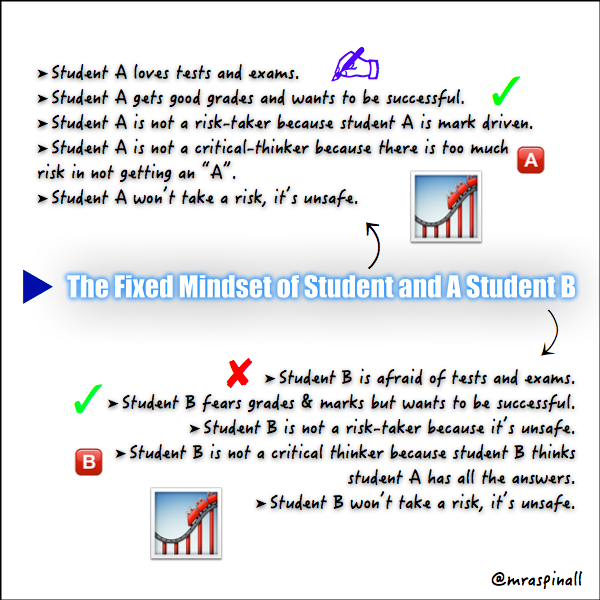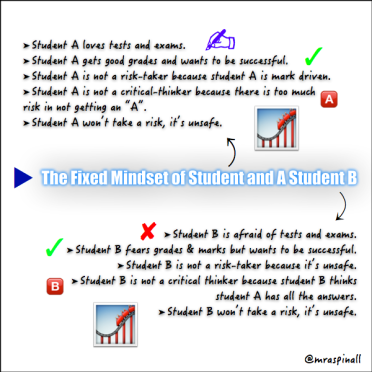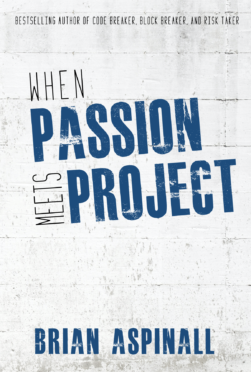I recently read “The engaged student vs. the compliant student” by @justintarte which got me thinking. Why is it always one or the other? Why is it compliance vs. curiosity or grades vs. no grades or engaged vs. disengaged or student choice vs. dictation or fixed vs. growth mindset as if pedagogy in education is so black and white because, really, It’s not.
No one can dictate what is best for them better than you. Maybe some groups need compliance. Maybe some groups thrive on choice. I don’t think there is a “one size fits all” model. While some students fear grades, many are driven by them.
I know, I sound like a hypocrite.
But really, I’d be naive to think every student in my class is engaged 100% of the time. I do my very best to ensure it, but let’s be honest.
I wonder if we place these buzzwords & categories to push thinking. Do we use such extreme scenarios and terms that are so ludicrous just to make a point? That can be very overwhelming to new -and experienced- teachers. On the contrary, if I mention “makerspace” or “Genius Hour” you know what I am talking about. Buzzwords can describe pedagogical thought and practice in 140 characters. They can also be incredibly overwhelming. Many teachers think SAMR is a ladder. It wasn’t intended to be. Substitution is perfectly acceptable in many scenarios. Just ask @rubenrp.
But I must confess….I am guilty of using buzzwords.
…But that’s OK.
I use them to describe scenarios. I use them to make extreme points to push thinking. I want to be challenged. I want to challenge others. We all have a next step. They key is to keep an open mind and be a professional.
I also encourage you to read “My concerns with Growth Mindset” by @avivaloca. She pushed my thinking just this week as we were discussing Growth vs. Fixed mindset. Sometimes a fixed mindset is the only option. Think equity and equality. I must admit, I was heavy on the Growth side.
When kids ask “is this going to be on this test” this is a question of compliance not curiosity @gcouros #r2scms15
— Alice Keeler (@alicekeeler) June 10, 2015
I suppose I should make more reference to the title of this post. Here I go again with my flip flop thinking.
I hate the word “compliance”. I also hate to use the word hate but it is inevitable when describing my gut feeling for compliance. My dog is compliant. (At least I want him to be 🙂 ). Similar thoughts on “training”.
I understand what is being suggested in Justin’s post. I believe he is trying to suggest that “traditional” classrooms of quiet desks and rows where everyone does the same task are not best practices by today’s standards in which we personalize learning and differentiate instruction. But curious & engaged students can be “compliant” too. Engaged students still follow rules and routines. After all, we need regulations for peoples’ safety.
Lastly, I encourage you to read “No Grades, No Problem” by @MrSoclassroom. Jonathan and I have become distant friends over the last few years in sharing similar “mindsets” (see what I did there? 🙂 ). In his post, he discusses the lack of report cards this year in Ontario being a non issue. And I have to agree. Why does a number dictate learning has happened, especially if the learning was personalized?
As we continue to push “21st century education” (boy, I am on fire today!), I firmly believe numerical grades are a crucial issue. Numerically, curiosity is difficult to measure. Creativity is difficult to measure. Collaboration is difficult to measure. Worksheets are simple to measure. Compliant rows of students working on spelling dictation is simple to measure. Facts and dates and regurgitation are simple to measure.
Lastly, in a giant sense of comical and hypocritical irony I am going to make reference to a previous post entitled “The Fixed Mindset of Student A and Student B” where I place all students into one of two categories. I know, right? However, my point was, and still is, generally speaking we have students who fear grades in some capacity and students who are driven by grades in some capacity. Neither of these students will take a risk because it is not safe. But we want to encourage risk taking in learning, don’t we?
To conclude, I want curious students too. I want students to inquire, be challenged, think critically and collaborate. It’s going to take some work to make this shift. We are ending hundreds of years of “best practices” and pedagogy is difficult to change.
I think we must change assessment first if we wish to accomplish anything else.
What do you think?


 For all the kids who grow up in a small town and think they don’t stand a chance. You do. I was once that kid.
For all the kids who grow up in a small town and think they don’t stand a chance. You do. I was once that kid.
Brian, you have a lot to think about in this blog post! A couple of things really stood out for me.
1) I’m not so sure that I agree that “nobody can dictate what is best for them [the students] better than you.” I understand the thinking behind this point, and I know that it’s shared a lot. I definitely know my students well, and in my head, I think that I know what’s best for them. But why is that? I often do because of what others have shared. It’s their ideas, their knowledge, and how they push my thinking (you included) that make me see my students and their needs differently. My program has changed so much over the course of this year because others (educators, administrators, support staff, and parents) have shared their thinking, their experiences, and have made me think differently. I wonder sometimes if we hold to this statement that “we’re the ones that always know what’s best for our students,” if we actually take on a more “fixed mindset” instead of a “growth one.” Do we close the door to different thinking or points of view? What do you think?
2) Thanks for sharing my post here! I really appreciated our dialogue about fixed vs. growth mindsets. Even though I have some concerns over the wording, I’m a big proponent of the thinking behind a “growth mindset.” I think it speaks to the power of perseverance (be that with adults or with children). I’m not sure that I would ever be in favour of a fixed mindset, even though I may be a bit tired of the buzz words. What did you mean when you said that, “Sometimes a fixed mindset is the only option?” Can you share more? Is there a way to changed this mindset to a growth one?
Thanks for continuing the discussion! I’m curious to hear what others think!
Aviva
“No one knows your students better than you”
“You” should be a collective of all staff and the community, not just the homeroom teacher.
Great insight, Aviva.
I like the idea of a collective “you.” I wonder how many others see it that way. Great point, Brian!
Aviva
Different strokes for different folks. I would love a system where students are permitted to progress at their own pace. I would like for us to focus on teaching students how to teach themselves. I dislike how we test students against a standard and blame them for not fitting into our expectations when they produce low scores. Why do we then place all these students together into smaller groups where the expectations and teaching approach that they didn’t initially respond to doesn’t often change?
Compliance was once acheived via fear, but students and parents are mostly fearless these days. So, who gets to steer the school system now? Personally, the greatest development I see comes from students directing their own learning. My Independent Study Units, where there is guidance and help instead of lessons, ALWAYS produces great engagement and student growth. The process is evaluated, not the product, and this evaluation is to determine individual skill development.
Great blog. I vote for curiosity, but assessment needs to change before that is permitted.
Hi Brian,
I’ve said it many times and blogged about it too…Nobody (except parents) know their students better than the teacher. There is no substitute for the relationships that are developed in a classroom where students feel that the teacher cares for them and they are challenged but supported in their learning as well.
You really gave me so much to think about! Many days I simply struggle just trying to engage my students-so many don’t want to take any kind of risk in the classroom. They want the worksheet and then they want me to guide them through the answers. Arg! But I will continue to struggle on and do my best to grow and help my students develop a growth mindset!
When students ask for worksheets because “they are easier” you know you are truly challenging them!